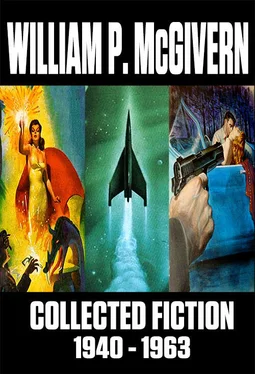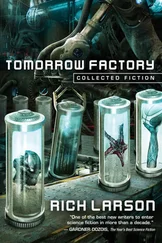Уильям Макгиверн - Collected Fiction - 1940-1963
Здесь есть возможность читать онлайн «Уильям Макгиверн - Collected Fiction - 1940-1963» весь текст электронной книги совершенно бесплатно (целиком полную версию без сокращений). В некоторых случаях можно слушать аудио, скачать через торрент в формате fb2 и присутствует краткое содержание. Год выпуска: 2014, Издательство: Jerry eBooks, Жанр: Ужасы и Мистика, Фантастика и фэнтези, Детектив, Прочие приключения, на английском языке. Описание произведения, (предисловие) а так же отзывы посетителей доступны на портале библиотеки ЛибКат.
- Название:Collected Fiction: 1940-1963
- Автор:
- Издательство:Jerry eBooks
- Жанр:
- Год:2014
- ISBN:нет данных
- Рейтинг книги:3 / 5. Голосов: 1
-
Избранное:Добавить в избранное
- Отзывы:
-
Ваша оценка:
- 60
- 1
- 2
- 3
- 4
- 5
Collected Fiction: 1940-1963: краткое содержание, описание и аннотация
Предлагаем к чтению аннотацию, описание, краткое содержание или предисловие (зависит от того, что написал сам автор книги «Collected Fiction: 1940-1963»). Если вы не нашли необходимую информацию о книге — напишите в комментариях, мы постараемся отыскать её.
Collected Fiction: 1940-1963 — читать онлайн бесплатно полную книгу (весь текст) целиком
Ниже представлен текст книги, разбитый по страницам. Система сохранения места последней прочитанной страницы, позволяет с удобством читать онлайн бесплатно книгу «Collected Fiction: 1940-1963», без необходимости каждый раз заново искать на чём Вы остановились. Поставьте закладку, и сможете в любой момент перейти на страницу, на которой закончили чтение.
Интервал:
Закладка:
The current file of stolen cars was impaled on a spike near Tonelli’s big right hand, and he flipped through the lists with automatic efficiency while continuing to monitor the reports crackling from the speaker above his switchboard. Sergeant Tonelli was responsible for approximately one third of the hundred-mile length of the turnpike. This area was designated as Headquarters North. Two subsidiary stations, Substation Central and Substation South, divided the remaining sixty-odd miles between them; their responsibility was limited to traffic, and in all other matters they look orders from headquarters and Captain Royce.
Under Sergeant Tonelli’s direct control were eighteen patrol cars, assorted ambulances, tow trucks, fire and riot equipment. In his mind was a faithful and imaginative picture of the turnpike at this exact moment; he knew to the mile the location of each patrol car and what it was doing; he knew of the speeding Mercedes-Benz being chased ten miles north; he knew of the accident that had plugged up the slow and middle lanes beyond Interchange 10, and he knew, of course, that Dan O’Leary, Car 21, was presently investigating a Buick parked at Milepost 114.
In addition to this routine activity, Sergeant Tonelli was considering certain areas of the problem that faced Captain Royce. The President of the United States would be riding on the turnpike tonight, entering in convoy at Interchange 5 and traveling south to the end of the pike, a distance of about fifty miles. Sergeant Tonelli would dispatch certain of his patrol cars to that area in an hour or so, and he was turning over in his mind how best to take up the slack that would be caused by their departure.
But meanwhile he continued his check of the stolen-cars file, a check which proved futile.
III
Trooper O’Leary returned to his patrol car and called headquarters. He said to Tonelli, “Car Twenty-one. O’Leary. Looks like the Buick’s out of gas. The driver must have walked up to the Howard Johnson’s. I’ll check and see if he needs help.”
“Proceed, Twenty-one.”
O’Leary drove into the service area and pulled up to the gas pumps. A wiry, gray-haired attendant hurried to his car.
O’Leary rolled down his window, “Anyone been in for a can of gas, Tom?”
“Not a soul, Dan. Not since this morning, anyway.”
“O.K., thanks,” O’Leary said and drove back to the parking area that flanked the restaurant. The owner of the disabled car might have slopped for something to eat, he thought. O’Leary straightened his shoulders and dark-green jacket before walking into the warm foyer of the restaurant, but both of these corrective gestures were unnecessary; his back was straight as a board, and his uniform was trig and immaculate. O’Leary was twenty-eight, solidly and powerfully built, but his stride would have pleased a drill sergeant. There was almost a touch of arrogance in the set of his head and shoulders, and he handled his body as if it were a machine he understood and trusted completely. He had short black hair and eyes as cold and hard as marbles, but there was something boyish about the seriousness of his expression and the clean, wind-scrubbed look of his skin.
O’Leary had one fact that might help him find his missing motorist; he probably wasn’t wearing a hat or overcoat. He had left them in the car.
But the hostess who escorted diners to tables remembered no such person. “Not in the last ten or fifteen minutes, Dan.” She glanced around the restaurant, which was divided into two large wings, one on either side of a long soda fountain and take-out counter. Both were crowded; the air was noisy with conversation and the clatter of cutlery and dishes. “Or course, he might have come in while I was seating someone.”
He couldn’t have found a table for himself?”
“Not when it’s crowded like this. But he might have gone to the take-out counter.”
“Thanks. I’ll check that.”
O’Leary stood patiently at the take-out counter while the waitress took an order for hamburgers, French Tries, milk and coffee from a thin young man who seemed vaguely embarrassed at putting her to so much trouble, He smiled nervously at O’Leary and said, “The kids are too little to bring in here. They’d play with the menus and water glasses instead of eating. My wife thinks it’s easier to feed them in the car.”
“She probably knows best,” O’Leary said. “Anyway, eating in a car is pretty exciting for kids.”
“Yes, they get a kick out of it.” The young man seemed relieved by O’Leary’s understanding air. When he went away with his sackful of food, O’Leary asked the waitress if she had served a man recently who wasn’t wearing a hat or overcoat.
“Gee, I don’t think so, Dan.” She was a plain and plump young woman, with mild brown eyes. Her name was Millie. “How come he wasn’t wearing an overcoat?”
“He left it in his car, which is out of gas about two hundred yards from here. I guess he figured he wouldn’t freeze in that time.”
At this point it was a routine investigation, a small departure from O’Leary’s normal work of shepherding traffic along the pike, of running down speeders, of watching for drivers who seemed fatigued or erratic, of arresting hitchhikers, or assisting motorists in any and all kinds of trouble. A car out of gas, the owner not in evidence at the moment; that’s all it amounted to. He might be in a washroom, might have stopped in the service-station office to buy cigarettes or make a phone call. There was no law against his doing any of these things. But O’Leary wanted to find him and get his car back in operation. The safety of the pike depended on smoothly flowing traffic; any stalled car was dangerous.
“Do you want a cup of coffee?” the waitress asked him.
“No, thanks, Millie.” There would be little time for coffee breaks tonight, he knew. A threat of rain was on the cold, damp air, and that meant the hazards of thickening traffic and difficult driving conditions. Also there was the convoy; every trooper on the pike had been alerted to that responsibility.
But at that moment there was an interruption which took O’Leary’s mind off his missing motorist: a dark-haired girl came up beside Millie and said breathlessly, “Has Dan told you about the glamorous date he has tonight?”
“Now, Sheila,” O’Leary said, and ran a finger under his collar.
“Tonight and every night,” Sheila said with an envious sigh, which O’Leary knew was about as sincere as the average speeder’s excuse and contrition. “You see, Millie,” Sheila went on, “Dan and I had a date last Tuesday, and before we went home he took me up to Leonard’s Hill. We could see the turnpike below us, the headlights blazing like long strings of diamonds in the darkness. And do you know what he told me?”
“Now, Sheila!” O’Leary said helplessly.
“He told me he loved the turnpike. Isn’t that lucky for him? Night after night he’s close to his one true love — a hundred miles of asphalt.”
“It’s concrete,” O’Leary said miserably; he knew it was a token point, but he disliked inaccuracies about the turnpike, major or minor. The fact was, he did love that hundred-mile stretch of concrete. And sitting in the darkness with Sheila the other night, it had seemed natural to put the thought into words. Why was he such a fool? And why did she make him feel so helpless and vulnerable? The top of her head barely reached his shoulders, and he could swing her hundred-odd pounds into the air as easily as he would a child, but these things made no difference; he was clumsy and inept with her, driven to silly talk by something intangible and mysterious that radiated from her personality. It wasn’t mere beauty, he knew that much; as an Irishman he was also a poet, and while he appreciated her green eyes and elegantly slim body, his heart and soul responded to more than these physical attractions. There was a quality of grace and strength about her, a thread of steel and music permeating her whole being, and because of this — and because I’m a fool, he thought — he had blurted out his feelings to her that night as they sat watching the traffic on the pike.
Читать дальшеИнтервал:
Закладка:
Похожие книги на «Collected Fiction: 1940-1963»
Представляем Вашему вниманию похожие книги на «Collected Fiction: 1940-1963» списком для выбора. Мы отобрали схожую по названию и смыслу литературу в надежде предоставить читателям больше вариантов отыскать новые, интересные, ещё непрочитанные произведения.
Обсуждение, отзывы о книге «Collected Fiction: 1940-1963» и просто собственные мнения читателей. Оставьте ваши комментарии, напишите, что Вы думаете о произведении, его смысле или главных героях. Укажите что конкретно понравилось, а что нет, и почему Вы так считаете.

![Уильям Макгиверн - Завтра опять неизвестность [английский и русский параллельные тексты]](/books/35168/uilyam-makgivern-zavtra-opyat-neizvestnost-angli-thumb.webp)









